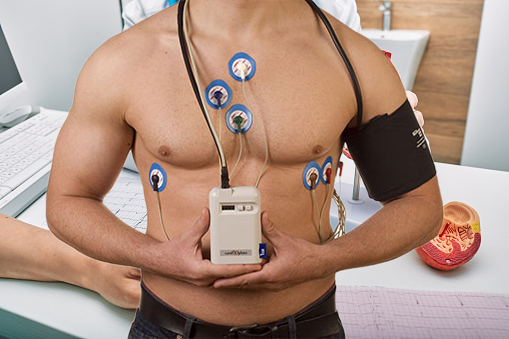Holter Monitoring in Vijayanagar, Bengaluru
A Holter monitor is a small, wearable device that records the heart’s rhythm. It’s used to detect or determine the risk of irregular heartbeats (arrhythmias). A Holter monitor test may be done if a traditional electrocardiogram (ECG or EKG) doesn’t provide enough details about the heart’s condition.
The information recorded on the Holter monitor will help the doctor to find out if there is any problem with your heart rhythm. Sometimes, a standard Holter monitor may not record any abnormality in your heart rhythm; in such a case the doctor may ask you to wear the device for a longer time.
The Dr.Vikram.B.Kolhari at Souram Health Centre are well qualified and experienced and He can suggest the best possible treatment for your condition. The doctor will also discuss the other results shown on your Holter monitor in detail for proper evaluation of your health.
Before the Test
You must know some details so that you do not have any fear or anxiety before the test.
You will decide a suitable time with your doctor to perform the test. You have to spare a day or two for the test. So, pick a time when you do not have to travel or avoid any water-based activities, and activities that require hard physical work. You will also be asked to remove any metal jewelry around your neck that may interfere with the results.
The Holter monitor will be attached to your body by a technician. It will take only a few minutes. You will be asked to come back to the same facility after the Holter monitoring is finished to get it removed.
You should wear comfortable and loose-fitting clothes so that the monitor can be comfortably placed underneath. Men may be asked to shave certain small areas of the chest to attach the electrodes, wires, and machine properly.
You can eat and drink normally before the Holter Monitor Test in Hyderabad unless your doctor tells you otherwise and you can also take your routine medicines. You should take a bath before Holter monitoring because you cannot take a bath once you are wearing the device.
During the Test
A Holter monitor has some small electrode patches that are attached to your skin using small wires to a recording device. The recording device is a digital monitor and recorder that is placed around your neck or attached to your best. Everything including electrodes, wires, and recording devices is hidden under the clothes. The technician will give instructions on do’s and don’ts and will ask you to keep a record of your symptoms and activities while wearing the device. You can go back home.
Throughout the test
There is no special care to be taken during the test. While wearing the Holter monitoring device you can carry out your normal daily activities except to avoid showering and bathing. You also have to keep a record of all the symptoms and activities throughout the test. If you notice any symptoms of palpitations, chest pain, lightheadedness, syncope, or shortness of breath you must immediately tell your doctor.
After the test
When the Holter Monitor Test ends, you will return to the outpatient facility. The electrodes and wires are removed and the monitoring device is sent to the doctor for analysis. Your doctor will contact you within one or two weeks with the results and possible next steps.
Interpreting the results of the test
Your doctor will contact you with the results or you can schedule a visit with the doctor to discuss the results of your Holter monitoring. When interpreting the results of Holter monitoring, the main aim is that this test is usually done to find out if your symptoms are due to cardiac arrhythmia or not. Any correlating symptoms with the occurrence of arrhythmia can help in making a diagnosis.
Many people do not experience any symptoms due to arrhythmia. But, if an arrhythmia is seen on a Holter monitor without having any symptoms it means that the arrhythmia is not dangerous and no treatment is required.
What exactly does cardiology entail?
A cardiologist will do a physical examination and analyze the patient’s medical history.
They may perform tests and evaluate their weight, heart, lungs, blood pressure, and blood vessels.
An interventional cardiologist may perform angioplasties, stenting, valvuloplasties, congenital heart defect repairs, and coronary thrombectomies.
- Tests
- They can also perform or order the following tests:
- Pin it to Pinterest
- A cath lab’s technology allows the doctor to see the heart’s condition.
- The electrical activity of the heart is recorded by an electrocardiogram (ECG or EKG).


Dr. Vikram B. Kolhari
MBBS, MD (Gen Medicine), DM (Cardiology)
Cardiology Departments


